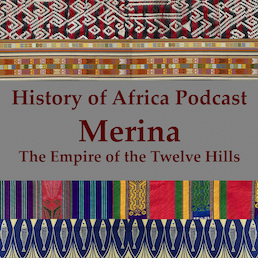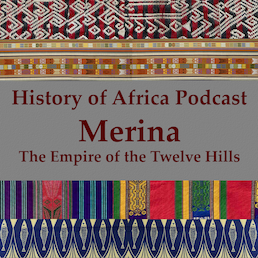Discover History of Africa
History of Africa

History of Africa
Author: The History of Africa Podcast
Subscribed: 2,010Played: 32,716Subscribe
Share
© 2023 History of Africa
Description
Take a deep dive deep into African history with this in-depth podcast. From Casablanca to Cape Town, tune in to this podcast to learn about the magnificent and oft-forgotten history of Africa. To access more free resources about African history, provide feedback, or support the show, check out our associated website at https://historyofafricapodcast.blogspot.com
113 Episodes
Reverse
Today we begin our journey into the history of the Garamantes, a civilization from the Libyan Sahara. This fascinating civilization transformed the barren wasteland of the Idehan Ubari into an impressive metropolis of late antiquity.
Our current episode examines the prehistory of Libya through close inspection of rock art.
In a betrayal of previous commitments to Madagascar, Britain revoked its recognition of Malagasy sovereignty in a deal with France, in exchange for French recognition of a British protectorate over Zanzibar. Soon after this deal, the French invaded Madagascar, landing troops in Mahajanga and Toamasina. The final war to conquer Madagascar had begun.
Support the show
Rainilaiarivony makes a desperate bet to try and repair his nation's floundering economy following the end of the French blockade of Madagascar. His desperate solution: to open Madagascar's long dormant gold mines for business.
Support the show
As the French begin their invasion of Madagascar's major ports in 1883, the queen of Madagascar falls deathly ill. In this atmosphere of chaos, the prime minister Rainilaiarivony must mount a desperate attempt to protect Merina sovereignty with the help of an unexpected ally.
Support the show
As Malagasy prime minister Rainilaiarivony tries to distance his kingdom from French commercial interests, the French strike back. Eager to avenge his country's recent defeat in Europe, the French head of state becomes increasingly invested in colonial conquest. In an effort to drum up international support, Malagasy diplomats make a trip to London, Paris, and New York City.
Support the show
In the aftermath of the controversial coup against Radama II, the new head of state, prime minister Rainivoninahitriniony, was in a tumultuous position. He and the fellow orchestrators of the coup had committed the unprecedented act of overthrowing the mpanjaka Imerina. He attempted to legitimize the bureaucratic takeover by marrying one of Radama's wives, Rasoherina, as well as drafting a new constitution for Imerina. While the constitution would last, Rainivoninahitriniony did not, and he was himself overthrown by his brother in 1864. This brother was Rainilaiarivony, one of the top ranking generals in the Malagasy army, who proceeded to implement a de facto military dictatorship, overthrowing his brother and declaring himself prime minister. While Rasoherina remained the official head of state, Rainilaiarivony was the true power behind the throne.
Support the show
Ranavalona reluctantly begins to thaw the relations between her island kingdom and her long-time French adversaries. However, when a French businessman immediately tries to take advantage of the thaw, and prepares a coup to overthrow Ranavalona, place her son in power, and create a company with a monopoly on the Malagasy economy.
Support the show
Ranavalona has a reputation that precedes her as Madagascar's most unhinged and cruel despot. However, while this narrative is based in some truth, it severely lacks in an understanding of the nuances of her reign. This episode examines the truth and fiction behind Ranavalona's reputation as the "mad empress" of Madagascar
Support the show
The economic progress made under Ranavalona's early reign was seemingly awe-inspiring. The country had rapidly transformed from a feudal state pumping endless sums of cash into perpetually failing companies, into a more coherent system of state-run capitalism. However, this economic progress came at an enormous human price and was propped up by a system of horrifically brutal exploitation.This episode will focus on unfree labor within the Merina economy, with a focus on how the Merina system justified and explained the use of enslaved and corvee labor, the effect that reliance on unfree labor had on the Merina economy, and how unfree laborers responded to their oppression.
Support the show
Ranavalona hires a new group of foreign artisans like Jean Laborde and James Cameron to hasten the transformation of Madagascar into a modern, industrialized economy. Will the Merina Kingdom become the first industrialized country in Africa?
Support the show
When Radama I died without a clear heir, his wife, Ranavalona I, allied with a group of military officers to secure her place as the new queen of Madagascar. Almost immediately, she was faced with numerous challenges, including revolts from conquered peoples, criminal lynch mobs attacking Christians, growing resentment against missionary schools, a stumbling economy, and a French invasion of the largest Malagasy port. Not to mention she has to do it all while ruling as a woman - something which had never happened before in Merina history.
Support the show
An industrial revolution in Southeast Africa?
Following the abolition of the slave trade in 1817, the future of the economy of Imerina was in flux. Looking for a replacement for the system of slave trading, the Merina king Radama initiates a strategy of industrialization, one of the first intentional industrialization initiatives in history. Large iron forging complexes, agricultural processing facilities, leather tanning centers, and gunpowder manufacturing facilities were all part of Radama's plan to replace the slave trade economy with one of finished good manufacturing.
Support the show
Prior to his coronation, the king of Imerina, Radama, promised to his father that he would expand the kingdom towards the coast. In 1817, he accomplished this goal, conquering the largest port on Madagascar's eastern coast, Toamasina.
But this was only the beginning. With a new coastal possession, Imerina was launched into a global world of international politics. Starting in 1817, Radama initiated a crusade to "modernize" his kingdom, launching radical new reforms to its systems of education, economy, industry, and architecture.
In a sense, the reforms of the Merina kingdom mark the first period of history in which an African country tries to "catch up" with Europe, a phenomenon still relevant throughout Africa to this day. Imerina's fate in this quest is an informative story to follow for anyone interested in the questions of why certain countries are rich, others are poor, and how this relationship may be changed.
Support the show
If his father is the most remembered king in Madagascar, Radama is probably the best-known Malagasy king in the rest of the world. Radama is famous not only for leading the first major push to unify his home island but also for his later efforts to modernize and industrialize the Merina Empire. But how did this fascinating man come to power in the first place? Today, we track Radama's ascent from heir to the throne to the most powerful king in the history of Madagascar.
Support the show
In our last episode, Andrianampoinimerina reunited the warring kingdoms of Imerina after seven decades of intermittent civil war. While this alone is a significant achievement, Andrianampoinimerina also had to shoulder the considerable burden of trying to repair his economically and socially devastated kingdom. Through smart and efficient use of the Fanamapoana corvee labor system, Andrianampoinimerina directed the repair, construction, and maintenance of hundreds of canals and dams, which greatly revitalized the region's agricultural output. Combined with the end of the Sakalava raids, this resulted in a major population boom. Soil depletion and overpopulation, however, forced Merina people to expand their territory for further settlement, at the expense of neighboring people.
Support the show
Andrianampoinimerina is the most famous monarch in Malagasy history, and for good reason.
At a young age, Andrianampoinimerina, still then known by his birth name Rambosalamarazaka, quickly emerged as the favorite to inherit the kingdom of Ambohimanga. However, the kingdom was instead inherited by his uncle Andrianjafy. Throughout his rule, the king would enact several unpopular policies. His failed wars against the king of Antananarivo led to economic strife, as did growing tribute demands from Ambohimanga's Sakalava overlords. In order to cope with these growing demands, Andrianjafy made the unpopular decision to begin manufacturing criminal accusations against his own subjects to justify selling them into slavery. This unpopular decision justified a group of nobles in overthrowing Andrianjafy and placing Andrianampoinimerina into power.
Support the show
After Andriamasinavalona's passing, his sons' feud will blossom into a 70-year long civil war. Communities will tear each other apart, slave raiding will reach new heights, and famine will re-emerge as a new threat. Meanwhile, Merina rulers will engage in some experimental policies, like the minting of the region's first local coins, but mostly just kill each other.
Support the show
The 18th century will be a painful time for the people of Imerina. The once proud kingdom will devolve into a deadly multilateral civil war, splitting into dozens of smaller kingdoms, each suffering from intermittent famine and domination by foreign enemies. How could the kingdom of Andriamasinavalona, rapidly rising to become a major player in Madagascar, fall so far. The inciting incident lays at the feet of the otherwise great king Andriamasinavalona.
The mpanjaka Imerina had spread his kingdom several times beyond what his predecessors would have even considered possible. Could such a large kingdom survive in highland Madagascar? Andriamasinavalona believed that the answer was "no." Instead, he favored transforming the Merina kingdom into a confederation of four smaller states called Imerina Efa Toko, or "Imerina like the Legs of a Cooking Pot." The king's advisor Andriamampandry repeated warned him against the plan, cautioning that the newly empowered princes would immediately seek to make war with each other. But Andriamasinavalona persisted.
Support the show
The class conflict of Imerina comes to a head, as the free peasants of central Madagascar overthrow the hated king Razakatsitakatrandria. In his place they elevate Andriamasinavalona, a king far more willing to listen and act on their concerns, ushering in a golden age of Merina history.
Support the show
As Andrianjaka passes his stable but poor kingdom to his grandchildren, they undertake an enormous project to improve the agricultural output of Imerina. Their largest project, consisting of the miles of canals and terraces of Betsimitatra, would go on to transform the destiny of Imerina's history. This project, completed using the fanampoana system of conscript labor, would forever transform the demographics of Imerina by kicking off a decades-long trend of rapid Merina population growth.
Support the show
Top Podcasts
The Best New Comedy Podcast Right Now – June 2024The Best News Podcast Right Now – June 2024The Best New Business Podcast Right Now – June 2024The Best New Sports Podcast Right Now – June 2024The Best New True Crime Podcast Right Now – June 2024The Best New Joe Rogan Experience Podcast Right Now – June 20The Best New Dan Bongino Show Podcast Right Now – June 20The Best New Mark Levin Podcast – June 2024
 United States
United States









life got worse because of agriculture? what a dumb assertion. hunter gatherer life style was a tenuous existence at best and to assert that it is superior is ludicrous. agriculture exists because one was a lot less likely to starve when you could grow food. your out of touch with reality
Excited to learn about the anthropology & geographics of the African continent-
I love this podcast. thank you!
I'm really enjoying the podcast! I just hope there was no background music, it's quite distracting.